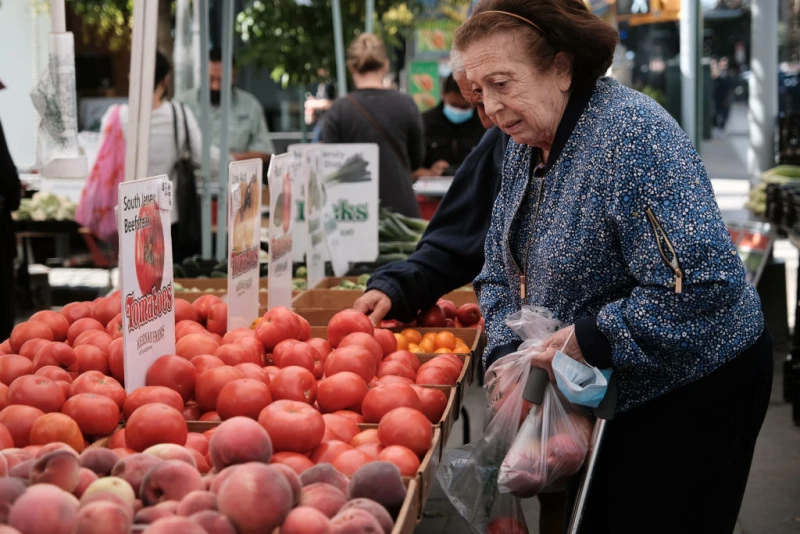
About 42 million Americans who rely on food stamps through the Supplemental Nutrition Assistance Program (SNAP) will lose those benefits Nov. 1. 2025, without enactment of a spending bill. / Credit: Jeff Bukowski/Shutterstock
Washington, D.C. Newsroom, Oct 29, 2025 / 12:27 pm (CNA).
Catholic charitable groups that provide food to needy families are voicing concern about the expected stoppage of federal food assistance programs as the government shutdown continues.
The shutdown reached Day 29 on Oct. 29, and unless lawmakers come to an agreement by the end of the week or the executive branch finds a solution, 42 million Americans who rely on food stamps through the Supplemental Nutrition Assistance Program (SNAP) will lose those benefits.
Congress can solve the problem by either passing a stand-alone bill to fund SNAP or by passing a bill that funds the entire government. Without any action, those who would normally receive food stamps on the first of the month will not receive any benefits in their accounts on Nov. 1.
“I don’t think SNAP has been curtailed in previous government shutdowns,” Deacon Kevin Sartorius, the CEO of Catholic Charities of Eastern Oklahoma, told CNA.
More than 685,000 Oklahomans receive SNAP benefits, which accounts for 17% of the state’s population — one of the highest rates of people on food assistance in the country. In eastern Oklahoma, the local Catholic Charities affiliate is the largest private provider of food assistance.
Sartorius explained that most people receiving SNAP benefits have jobs. He said their income is one means of obtaining food, and SNAP is the second source for low-income people. In eastern Oklahoma, he said “we’re the third” option to fall back on.
“We go from being the third level of support to the second [level of support] when SNAP disappears,” he said.
Sartorius said the impact is already being felt as some families prepare to potentially lose their SNAP benefits. Normally, in Tulsa, he said the Catholic Charities affiliate would serve about 175 families, but it increased to 205 last week and has now gone up to 292.
He noted that his organization will continue “loving the person who shows up and giving them food” but expressed concern that if SNAP is halted, that’s “an amazing amount of money that just disappeared overnight from people’s budgets.”
“We’re not going to be able to solve the problem independently, nor will any nonprofits, I don’t think,” Sartorius said.
“We cannot solve a very large system’s problem,” he added. “We can just care for the person who shows up today at our door.”
‘Hope we would all agree’
Rose Bak, the CEO of Catholic Charities of Oregon, told CNA that her affiliate primarily offers food to people in their affordable housing units, some of whom were previously homeless. She said most of them receive SNAP, and she has “heard a ton of concern” and “our clients and our residents are worried.”
She said most SNAP recipients are either working adults, children, or seniors, and “they don’t have a lot of options to get other funding.” In Oregon, about 18% of people receive SNAP benefits, which is also one of the highest rates in the nation.
Bak is also concerned that “a lot of people are confused” about what’s happening with SNAP at the moment and “weren’t understanding the notices” because they thought the notices were related to the upcoming changes to SNAP approved by Congress earlier this year. She said she is “really concerned about” some people not preparing properly due to misunderstanding.
In Oregon, she said the charity has “a little bit of food stockpiled for an emergency” and plans to be “releasing that food” if necessary but added: “We’re not going to be able to give people what they need” if the SNAP cessation lingers.
“I would hope we would all agree that people shouldn’t go hungry,” Bak said.
John Berry, president of the Society of St. Vincent de Paul (SVDP) in the United States, voiced concerns in a statement. SVDP is a Catholic nonprofit that helps feed needy families, among other charitable works.
Berry said “it is not our role to take sides in a political fight” but that “it is our role and our duty to speak on behalf of the friends and neighbors we serve.”
“Our most economically vulnerable brothers and sisters should not be forced to go without basic needs as a result of a partisan impasse, and it is time for both Republicans and Democrats in Congress to come together to ensure that the most marginalized among us will not abruptly lose critical benefits,” he said.
Berry urged the Department of Agriculture to “use every available mechanism, including the utilization of contingency reserves,” to ensure SNAP recipients can access food in November.
“It would be simply intolerable for people to unnecessarily go hungry as the shutdown heads into its second month,” he said.















